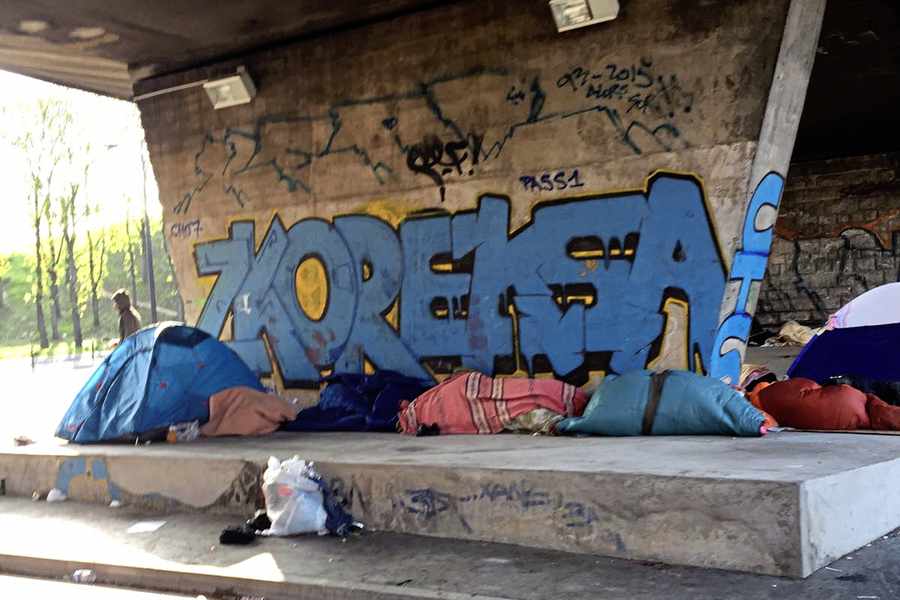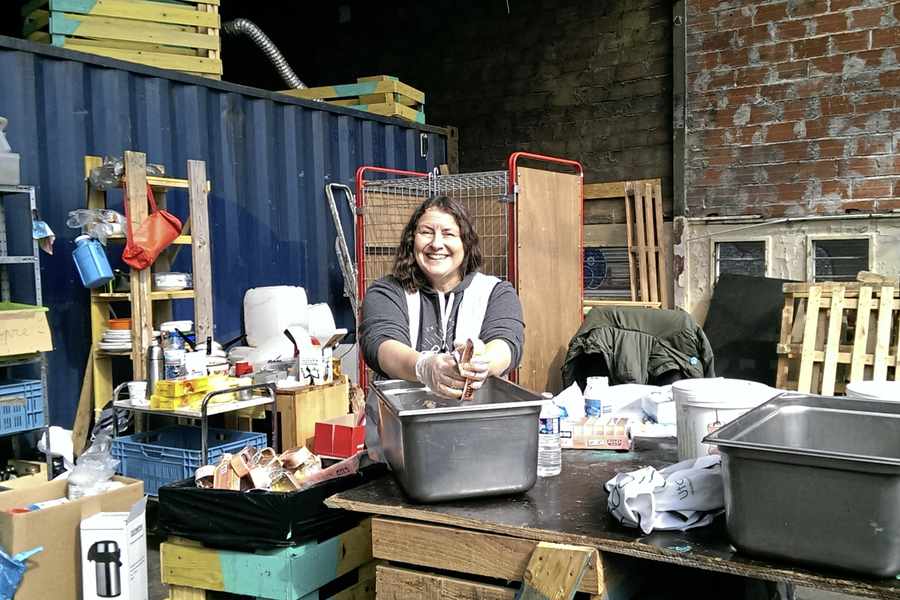The pair say goodnight to each other after having met in the capital. Asif will settle down for the night in a small blue tent under a bridge on a busy main road surrounded by litter with no access to clean water or much shelter from the elements.
Mohammad, on the other hand, has the luxury of a bed inside with blankets to keep him warm and access to a shower.

Asif and Mohammad both grew up in Ghazni, a small village in the Paktia Province in Afghanistan, and have become close friends since meeting in Paris.
Mohammad is one of the lucky 400 who gets to stay inside a huge warehouse in Porte de la Chapelle for ten nights before he is moved to another centre set up to help the migrants formerly in the Calais ‘Jungle’. The warehouse is run by the charity Emmaüs Solidarités and everyone inside has begun the asylum process.
In the warehouse are three floors of sheds which each house four people. There are also showers, a dining room, medical suites and access to clean clothes and washing machines. It’s first come, first served, and sadly for Asif he has not yet made it onto the growing list.
Instead, he is one of more than 400 people who are currently sleeping on the streets of Paris. He left his home in Afghanistan a year ago and has been sleeping rough for two months.
‘I left Afghanistan because the situation is very bad there,’ he said while sitting on a bench outside the centre, wearing just a T-shirt and second-hand jeans.
‘I walked for one month meeting different people along the way. While I was walking I would sleep in the forest and at the side of the road. It was very scary.
‘I travelled through Iran, Turkey, Bulgaria, Serbia, Germany and ended up in Paris two months ago. I have been sleeping on the street in a small tent since I arrived here.’
Asif, whose only possessions are the clothes on his back and a small tent, does not know when he will get a place at the charity shelter.
Last weekend six volunteers for Jersey Cares: Refugee Aid Group headed to Paris to work alongside the charity Utopia 56.
The charity works inside the warehouse alongside Emmaüs Solidarités.

Utopia 56 runs a clothes, food and tea distribution service and also washes blankets before handing them back out to those who have to spend the night on the street. The charity also searches for vulnerable children and women so it can place them in hotel accommodation – which it will pay for – until they can move into a centre.
Anyone staying in the centre will be given clean clothes twice during their ten-day stay, but items such as trainers and warm jackets are in short supply.
The six volunteers were in charge of distributing tea and flapjacks to dozens of people sleeping next to main roads. No sooner are the cups and flasks out of the crates, men from Afghanistan, Iraq, Somalia, Eritrea, Syria and Sudan gather round to wait for a warm drink and something sweet to eat. They ask for chai and take full advantage of milk and sugar, as they get very few nutrients from the limited food they eat.
Cups are handed out and distributed to as many people as possible but still some go without.
Men who were once students, doctors and teachers settle down for the night under blankets that they have had for weeks.
Those able to access the facilities inside the centre take their friends’ clothes and try to get them washed, as well as giving them food when they can.
Asif paid smugglers $10,000 to help him get to Paris. His mother, three brothers and three sisters remain in Afghanistan and he hopes one day he will be able to see them again.
‘I don’t have the right papers to stay in France at the moment but I hope I will get them,’ he said.
‘I try and talk to my family as much as I can and I miss them lots. It is not safe in Afghanistan – my family are not safe. My brothers and sisters are going to try and get to France.
‘The smugglers are not friendly people.
‘I hope to be in a proper house one day soon. I want to go to school but there are no schools I’m allowed to go to in Paris.
‘Lots of people say England is a good country. I think people are nice in England.’
Asif speaks enough English to hold a conversation. He is intelligent and hopes to continue his studies. He is also one of more than 400 people who remain homeless, with no idea of when he might be able to see his family again, or live a life better than the one he currently struggles with.
A 24-year-old man from Afghanistan, who wished to remain anonymous, took a similar journey to Asif and has been sleeping on the streets of Paris for three months.
He tells me the police in Bulgaria hit him with a pole and he waited a week to have stitches. He shows a photo of the cuts he suffered and asks how he can get to England.
‘We walked through the mountains and the forests and it was very hard,’ he said. ‘It was really tiring. Sometimes we had food but I had no money.
‘There were a lot of people trying to catch us and if they found us they would send us back to Afghanistan.
‘The Bulgarian police are very bad. They beat me with a pole and cut my head open. I had to have stitches a week later. It was very bad.
‘I waited a long time to get to a hospital and it was not good.’
The man paid smugglers $8,500 to get him to France and is reluctant to have his photo taken or tell me his name in case he is sent back.
He said: ‘I miss Afghanistan a lot.
‘I feel very sad and this is no way to live. I go and pray at the mosque every day.
‘If I pray, then I feel better.’






